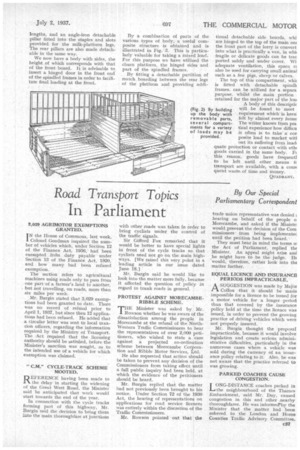Road Transport Topics
Page 83

If you've noticed an error in this article please click here to report it so we can fix it.
In Parliament
By Our Special Parliamentary Correspondent
3,029 AGRIMOTOR EXEMPTIONS GRANTED.
I N the House of Commons, last week, Colonel Goodman inquired the number of vehicles which, under Section 12 of the Finance Act, 1936, had been exempted from duty payable under Section 13 of the Finance Act, 1920, and how many had been refused exemption.
The section refers to agricultural machines using roads only to pass from one part of a farmer's land to another, but not travelling, on roads, more than six miles per week.
Mr. Burgin stated that 3,029 exemptions had been granted to date. There was no record of refusal prior to April 1, 1937, but since then 12 applications had been refused. He added that a circular letter was sent to local taxation officers, regarding the information required by the Ministry of Transport. The Act required that the licensing authority should be satisfied, before the Minister's sanction was sought, as to the intended use of a vehicle for which exemption was claimed.
" C.M." CYCLE-TRACK SCHEME MOOTED.
REFERENCE having been made to the delay in starting the widening of the Great West Road, the Minister said he anticipated that work would start towards the end of the year.
In connection with the cycle tracks forming part of this highway, Mr. Burgin said the decision to bring them into the main thoroughfare at junctions
with other roads was taken in order to bring cyclists under the control of the traffic. signals.
Sir Gifford Fox remarked that it would be better to have special lights in front of the cycle tracks so that cyclists need not go on the main highways. [We raised this very point in a leading article in our issue dated June 18.] Mr. Burgin said he would like to look into the matter more fully, because it affected the question of policy in regard to trunk roads in general.
PROTEST AGAINST MORECAMBERIBBLE SCHEME.
THE Minister was asked by Mr.
Rowson whether he was aware of the dissatisfaction among the people in Morecambe at the refusal of the NorthWestern Traffic Commissioners to hear the representatives of over 2,000 petitioners, who wished to state a case against a projected co-ordination scheme between Morecambe Corporation and Ribble Motor Services, Ltd.
He also requested that action should be taken to prevent any decision of the Commissioners from taking effect until a full public inquiry had been held, at which the evidence of the petitioners should be heard.
Mr. Burgin replied that the matter had not previously been brought to his notice. Under Section 72 of the 1930 Act, the hearing of representations on applications for road service licences was entirely within the discretion of the Traffic Commissioners.
Mr. Rowson pointed out that the
trade union representative was denied k hearing on behalf of the people o Morecambe, and asked if the Ministel would prevent the decision of the Corn missioners from being irnplementec until the petition had been heard.
They must bear in mind the terms oi the Act of Parliament, replied the Minister. An appeal might arise and he might have to be the judge. He would, therefore, rather look into the matter further.
EQUAL LICENCE AND INSURANCE PERIODS IMPRACTICABLE.
A SUGGESTION was made by Major Colfox that it should be made impossible for a licence to be issued for a motor vehicle for a longer period than that covered by the insurance policy held at the time the licence was issued, in order to prevent the growing practice of driving vehicles which were not properly insured.
Mr. Burgin thought the proposal impracticable, because it would involve legislation and create serious administrative difficulties, particularly in the numerous cases where a vehicle was sold during the currency of an insurance policy relating to it. Also, he was not aware that the practice referred to was growing.
PARKED COACHES CAUSE CONGESTION.
ONG-DISTANCE coaches parked in the neighbourhood of the Thames Embankment, said Mr. Day, caused congestion in this and other „nearby thoroughfares. He was informeerby the Minister that the matter had been referred to the London and Home Counties Traffic Advisory Committee.




















































































































































